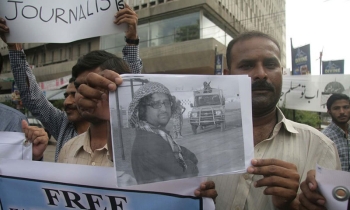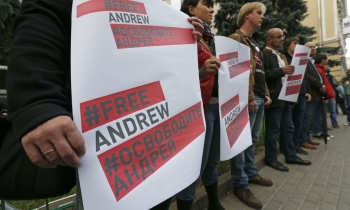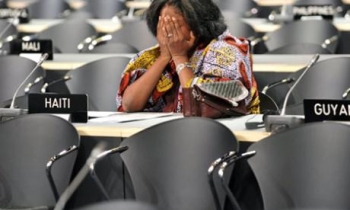The axiom that journalists should be dispassionate interpreters of events, no matter how harrowing, has been severely tested in the deadly wake of Hurricane Katrina.
The magnitude of the destruction left by the storm and the desperate straits of thousands of its victims were challenge enough. Many reporters, clearly affected by what they were seeing, showed their empathy in their stories, and some were moved to tears.
But when it became apparent that the government's response to the disaster was, at the very least, inadequate to the task, the sorrow turned to anger.
"It's a disgrace, and don't think the world isn't watching," a fuming Jack Cafferty said Thursday on CNN, as the screen showed foul shelters packed with victims in New Orleans. "Where is the federal government? Where is food and water for these people?"
On Friday, five days after the storm hit, as a federal relief convoy finally made its way into the stricken city, Cafferty summed up the delay: "It's embarrassing."
Cafferty was also furious that members of Congress took several days to come up with a $10.5 billion emergency appropriation for disaster relief, whereas they had taken far less time to convene over the Palm Sunday weekend in March for a vote that gave federal courts jurisdiction over the case of Terri Schiavo. "I guess it all depends on what's important to you," Cafferty said.
A Fox News correspondent, Shepard Smith, was outraged that the New Orleans mayor, C. Ray Nagin, had ordered buses to remove 400 stranded tourists from downtown hotels while thousands of his constituents were stuck in squalor until late in the week, with no way to leave.
"I don't know why they're being ignored," Smith said, visibly angry. "It just may be disorganization and chaos."
What seemed to gall many reporters on the scene was that the devastation in New Orleans and elsewhere on the Gulf Coast was at stark odds with the government's pronouncements that everything possible was being done to help Katrina's victims, some of whom, in fact, were dying for lack of food, water and medical attention.
Journalists who typically adhere to a professional objectivity stepped into their sometimes neglected role as advocates for the voiceless and began excoriating the Bush administration for what many agreed was a poorly executed reaction to the disaster.
In Biloxi, Miss., on Friday, as President Bush toured the region, he told a group of journalists, "We're going to clean this mess up." Still pointing to the future, Bush said, "We're going to stabilize the situation and then get food and water."
Not satisfied with that, a reporter asked him why "the richest country in the world can't get help to the people who need it."
Bush's reply - "I'm satisfied with the response; I'm not satisfied with all the results" - left some of the media members perplexed, and they said so. They were equally baffled by Bush's assertion that, in spite of the tragedy that had befallen Biloxi residents, "their spirits are high."
Some of the reporters derided a so-called photo opportunity in which Bush comforted two dispossessed women, put his arms around their shoulders, and then slowly walked past a group of photographers.
A few hours later, ABC led its broadcast of World News Tonight with the headline "Unacceptable Results." Correspondent Elizabeth Vargas, standing amid piles of rubble, asked, "Did the government learn anything from 9/11 about how to handle a major catastrophe?"
After the broadcast, Jon Banner, the program's executive producer, said in a telephone interview that it was the reporters' task to "ask a lot of tough questions and raise issues for our audience, and if that makes us advocates, so be it."
"This is the true nature of our job," Banner said, "to call attention to the enormity of the disaster and to find out if enough is being done."
As a corollary to that, he said, it is inevitable that reporters faced with rampant destruction and tragedy will be affected by what they see. "We're human beings first and journalists second," Banner said. "With some stories, it becomes clear that we are one large community. We're seeing this in lots of different places in recent history - Oklahoma City, 9/11. These are stories that affect all of us. And this is clearly an emotional story."
Whether the news media's empathetic treatment of the Katrina victims does anything to improve the profession's standing with the American public has yet to be established, but it was obvious that people around the country, fascinated by the disaster, were tuning into the televised reports, buying newspapers and surfing for Internet dispatches in huge numbers.
"It's good to see this kind of tragedy reinforce the idea in reporters' minds that they are a proxy for the public," said John Parker, a veteran reporter who spent 13 years at The Oklahoman and helped cover the bombing of the Alfred P. Murrah Federal Building in Oklahoma City in 1995. "There have been some good, strong interviews this week in which reporters are not accepting the easy answers. Too often, public officials will not answer questions and reporters let them get away with that."
On Friday evening in Waverly, Miss., CNN correspondent Anderson Cooper, in a telephone interview with Sen. Trent Lott, asked him, "Did the federal government fail?"
"Absolutely not," Lott replied. "The aid that you need desperately is not there, but it's coming." Cooper pressed on, asking Lott whether deaths might have been averted if the many National Guard troops from Louisiana and Mississippi who are deployed in Iraq and Afghanistan had been closer to home. "Only the news media is asking that question," Lott replied, prompting a spirited disagreement from Cooper, who said residents had approached him with the very same question.
Many journalists took issue in recent days with Bush's assertion that no one had expected the levees to break, when in fact such a scenario had been posited many times, most notably in a five-part series in The Times-Picayune in 2002 that warned that "even storms weaker than Category 3 could break through the levees" and destroy much of New Orleans.
"The city has been waiting for years for the worst-case scenario to happen," Bill Walsh, a Times-Picayune reporter, said Friday in a CNN interview. "I don't think anyone in Washington now can say they didn't see this coming."
The Louisiana congressional delegation, Walsh said, "has been beating this drum for years." On Fox, Bill O'Reilly took a dim view not only of the government's handling of the disaster - he called the relief effort a "hodgepodge" - but of the rise in gas prices, which he said had soared because the administration had "failed to promote energy conservation."
Speaking with Smith, the reporter who had expressed outrage about conditions in New Orleans, O'Reilly said, "You sound a little bitter, Shep."
"I can tell you things here are not equal," Smith said. Sounding increasingly distressed, Smith said victims had required food and water on the very first day of the disaster, "and on the fifth day they got food and water."
Not everyone approves of reporters becoming emotionally involved. Terry Michael, founder of the Washington Center for Politics and Journalism, a nonprofit educational foundation, said there was a trend in recent years, particularly in cable news, toward "more empathetic performances."
"In the early days of television, when the reporters came from print, they would never feel it was appropriate to display emotion because they would have felt it would have compromised their objectivity."
These days, Michael said, many television reporters "forget their responsibility as dispassionate interpreters of reality and they end up being part of the story."
But that might be unavoidable, said Marcy McGinnis, a senior vice president for news coverage at CBS News. She said she had cried Friday morning as she watched correspondent Tracy Smith report a story for The Early Show from the New Orleans convention center.
"Just because you're a reporter," McGinnis said, "doesn't mean you're made of stone and have no feelings whatsoever."
Beyond their personal reactions, many in the news media, striving for political correctness, spent the first few days of the tragedy carefully avoiding mention of the fact that the majority of the storm's victims - the ones crammed into squalid shelters - were low-income African-Americans. The effort to avoid even the appearance of bias meant that one of the most glaring aspects of the disaster - that authorities ordered everybody out of New Orleans before the storm without providing transportation for those who had none - remained unexplored.
It also resulted in some tortured, if genuine, attempts at sympathy. "They are so poor, and so black," said CNN's Wolf Blitzer, "and this is going to raise a lot of questions as we watch this story unfold."









